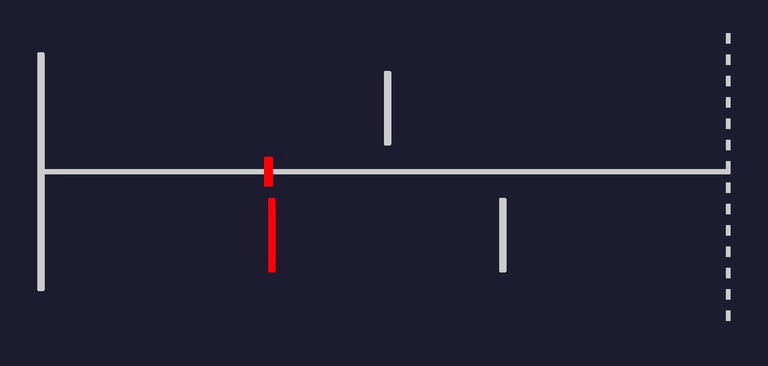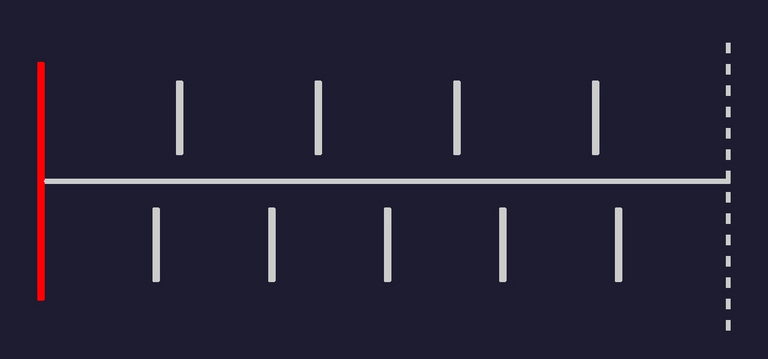2:3:4:5:6 polyrhythm???
Skip to the bottom if you just want to see my pointless but cool video.
Polyrhythms are a fascinating and yet mostly pointless endeavour.
Basically, a polyrhythm is when you have two different rhythms occurring at the same time. Technically, I'd probably call it polymeter, but that's for another day.
So, an easy and common polyrhythm is the good old 3:2. See if you can do it: With one hand, tap 3 beats. At the same time, tap two beats with your other hand.
An easy way to visualise:

The first beat, both hands (top & bottom) hit. Then left-right-left, then both hit once more.
Congratulations, you are engaging in advanced musical grooves!
But we can go way further.
Musical legend Jacob Collier recently showed a video of him doing a 21:22 polyrhythm while sitting in the London Underground:
With enough understanding, you can take this to any level with any pair of numbers (a drummer on YouTube demonstrated 99:100)
Some numbers are easier than others. 2:4, for example, simply means you play twice as fast with one hand. The same with 6:12 or 27:54. These don't really count as polyrhythms since they divide so cleanly into each other.
Polyrhythms typically don't match up for several beats, then strike only a single beat together before drifting apart again.
This does have many interesting musical applications. Steve Reich plays with a similar idea he calls 'Phase-shifting', where two musicians play the exact same repeating melody, then one musician speeds up just slightly faster than the others. The two musicians blur out of time with each other until the faster musician is exactly one beat ahead, then returning to the same speed as the first musician.
This, I can't imagine how difficult it must be to perform live, but the results are quite fascinating. One is able to make long musical strings that vary in rhythm and melody simply by changing their starting points and matching up at different beats.
I've talked about the J-pop band Perfume before with their use of polyrhythms. Now I wouldn't claim the cutesey dancing girls had anything to do with it, but the producer of one of their tracks, aptly named 'polyrhythm' used these mis-matched beats during the break to create really powerful tension, before finally slamming down all beats and melodies at once and drifting into softer music.
This idea of tension-release is ubiquitous throughout music and time, with composers adopting innumerable creative ideas to bring this to their music. After all, what is heaven without hell? What is happiness without sadness?
Tension is a great tool to remind us what it feels like to go back to stability and normality. Polyrhythms can help with that.
2:3:4:5:6???
Why just have 2:3? Why not 2:3:4? or beyond?
Well once again, in comes Jacob Collier with a 'silly party trick', using his 5 digits on one hand. Each finger strikes a different number of beats before matching up all together at the end.
- The thumb beats 6 times
- The index 5 times
- The middle 4 times
- The ring finger 3 times
- The pinky 2 times
When I first saw this, I brushed it off as impossible and moved on, already well established in my respect for his general genius. But then I realized I have a lot of free time, so I looked up others who managed to do it, realized it was not impossible and spent half an afternoon working it out.
And here it is!
For most fingers, it was fairly straightforward; just a matter of feeling out the rhythm. This is because 2, 3 and 6 all divide into each other, and 4 divides into 2, but also creates that simple 'dotted' rhythm of the aforementioned 3:2, but just doubled up - 6:4.
Thus, four of the 5 fingers I learnt to play together within a few minutes.
The index finger... phew, that's a whole different story. 5 beats don't divide into any of those numbers. Not a single beat aside from the first one matches up with ANY of the others, nor do they hit any reasonable offbeat, or 'syncopation'. It feels like you're playing at a different speed, or phase shifting.
So the first thing I had to do was spend some time working out just 5:6, which looks like this:

To make this easy, I had to sub-divide each beat of my thumb into 5 smaller beats. My index would fall on 1, then 2, then 3, then 4 and then 5 of these subdivisions, before returning back to 1:
Once I was comfortable with that, it was just a matter of somehow combining those two fingers... with the rest.
I knew that the pink struck on every 3rd beat of the thumb. I also knew that the ring finger struck on every 2nd beat of the thumb.
The trickiest part - which I still haven't perfected - is the 4 beats of the middle finger, which would normally feel easy enough as a 3:2 polyrhythm, but with everything going on all around it, that feel became utterly meaningless.
Instead I just had to incorporate it into the 5-beat subdivisions. But this wasn't easy. This is because beat TWO doesn't strike on any of those 5 subdivisons! Instead, it hits on... 3.5. The same problem occurs on beat FOUR, in reverse.
This is the part that took up most of my time, but I can get it perfect perhaps 60% of the time now.
What's the point?
None, really. I don't think it particularly improves any reasonable skill. Perhaps it incrementally improves rhythm in some abstract way. groupings of 5 are quite interesting and a useful tool to become comfortable with for the aforementioned reason of tension-release.
I am very curious whether or not I can apply this beat to something actually musical. It seems like a mighty challenge. Worked pretty well with David Bowie, though.
But anyway, why does it need a point? It was just fun. I started doing it at work for an hour, then I was doing it on my lap on the commute home, then in the cafe, then after my Chinese class, I walked home tapping my fingers, now we're here, in a Universe where I can do 2:3:4:5:6 polyrhythms.
@tipu curate
Upvoted 👌 (Mana: 10/20) Liquid rewards.
Seems Hive blog is still messed up, no videos? Go to peakd
Excellent blog, polyrhythm is little addressed by musicians, but mastering different patterns will give us greater dexterity to execute less complex rhythms.
Good point! A student of mine asked me if he needs theory knowledge in order to be a musician - I said no, he said 'then why should I study theory'?
I love these questions. They think they've tripped me up but I see so much application in seemingly useless things like polyrhythms
Oops, wrong account lol. Oh well
Hehehe! Saying whether it is necessary to know theory to be a musician is subjective, talent makes everything possible, but knowing theory will give advantages. I am Venezuelan, and here you can see a lot of talent, once working as a pianist for a teacher of lyrical singing, we met many good singers who solfed very little, and the teacher scolded them, the last lyrical singer who made a career told them Without knowing about music, it was Luciano Pavaroti, since his voice was only enough for him. Today you will have to compete with people who have as good a voice as you and also know how to play music. Hehehehe
The competition is insanely tough these days, since you can be either prodigal from birth or totally talentless and still swamp the market with your product and drown everyone else out. It makes me the ultimate fool for getting my degree in the subject! But I knew that going in so whatever.
Sorry for the late reply, comment issues on here I just think I solved...
Greetings friend, it really is so, the competition forces us to prepare ourselves more to be competent in an industry that is very indolent and sometimes ungrateful, this may sound harsh, but sometimes not being prepared enough when working with other musicians better prepared, it can be the cause that we are banned, the better prepared we are, obviously it will help us to have advantages. In the same way, there are still exceptions where really virtuous musicians do not need theory to be preferred, because in the same way music is really evaluated when you appreciate what you do when listening to you, how I said it, in the first answer, it is something really subjective.